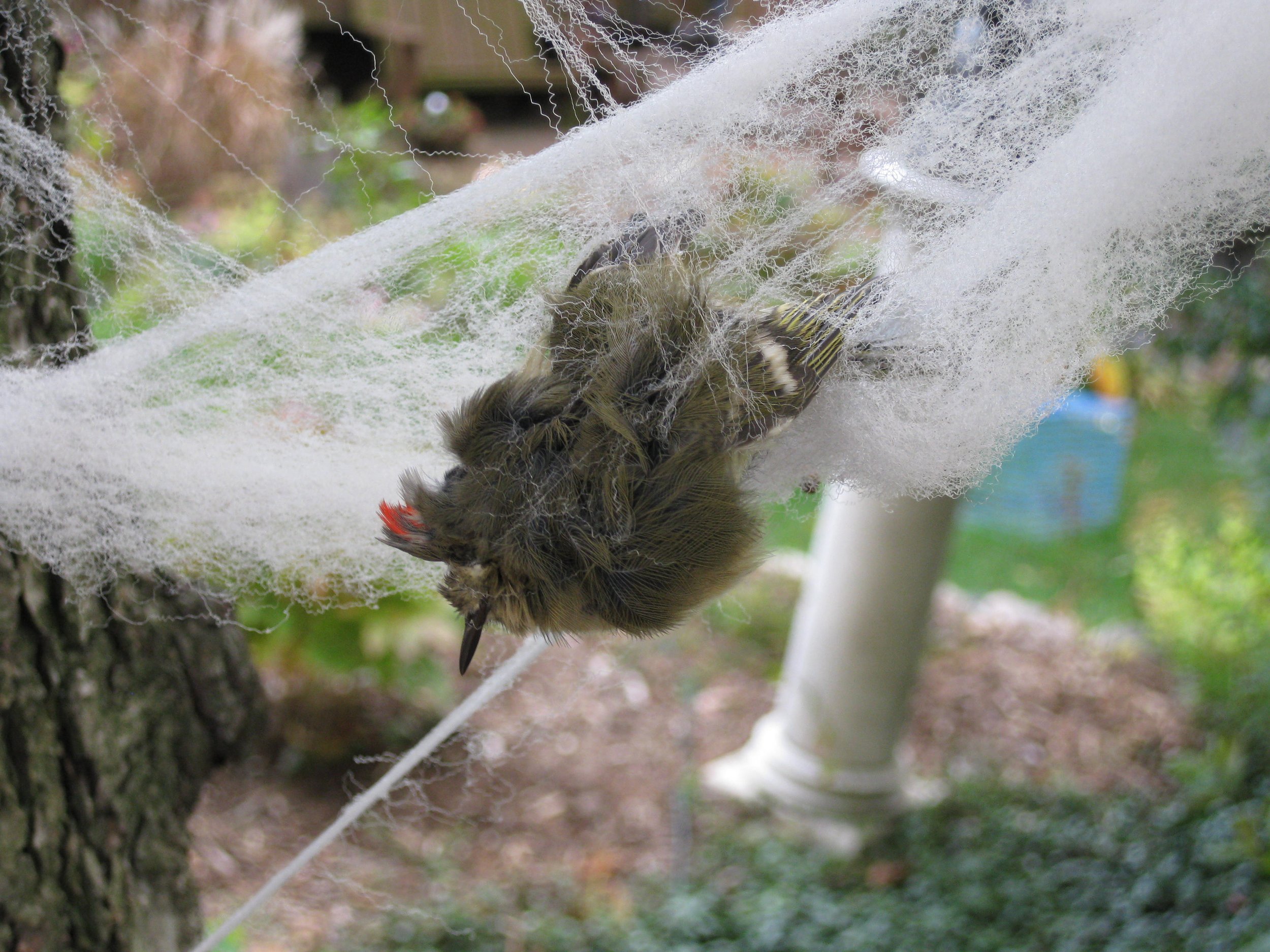Holiday Decor Danger
American Robin caught in fake spider webs.
words by Kelly Bednara
photos courtesy of Willowbrook Wildlife Center
Late September through October marks fall migration, when many of our northern friends are passing through to get to their winter homes. Some birds that migrate will stay throughout the winter season. Along with that, the leaves are beginning to change from a crisp refreshing green to a warm cozy orange. The air starts to hold a slight chill that lingers from the early morning. Soon porches will be adorned with pumpkins, 12-foot-tall skeletons, inflatables, and fake spider-webbing. After that, the leaves will fall, leaving barren trees and hopefully a light dusting of snow in the yard after a particularly cold night. Gutters will be lined with colorful flickering lights. Artificial garlands and wreaths with fake berries will cover porches and doorways. Silvery tinsel will be spread around shrubs and trees throughout the neighborhoods.
Typically, when decorating for holidays, not much thought is put into the safety of wildlife until something goes wrong in your backyard. In 2011, a Western Screech-Owl made the news after getting caught up in a fake spider web outside of a home in San Rafael, California. It was reported that the owl was tangled for several hours before someone notified the local humane society. There isn’t a hard statistic representing how many birds get caught in fake spider webbing each year, but it does occur. Stephanie Touzalin from Willowbrook Wildlife Center explained why there isn’t necessarily a hard number: “Typically when birds come in with an injury we’re not always given the background context of what happened. We know it happens because we’ve seen it.” She proceeded to share some photos of a Ruby-Crowned Kinglet and an American Robin that got trapped in fake spider webbing from a few years ago.
Ruby-crowned Kinglet caught in fake spider webs.
All those birds wound up okay, but that’s not always the case for other wildlife. Winters in Chicago are still very cold even when there is no snow. Birds can very easily get caught in lights or fine netting that is sometimes used for decorating. When birds are wrapped up in these decorations they can’t flap their wings, which can cause them to freeze to death in a matter of minutes on a n a very cold winter day. The exact date of the photo below is unknown, but it was taken in the Chicagoland area by the Willowbrook Wildlife Center.
Great Horned Owl entangled in a string of holiday lights.
This owl had gotten caught up in loosely strung holiday lights. The owl was okay after this incident, but it could easily have ended badly for them.
What can you do to help birds and other wildlife this holiday season?
There are many ways that you can decorate for the holiday season while still being mindful of birds and other wildlife. Stephanie provided her thoughts on decorating for the holiday: “Be mindful of sharp edges and decor design. Birds and wildlife are very good at getting themselves caught up in ways we wouldn’t have imagined.” She went on to provide a few examples.
Avoid putting up fake spider webbing in bushes and trees, instead hang them up inside your windows to give your home a spooky feel.
Decorate windows with festive decals to help keep birds from colliding with windows.
Birds may be attracted to fake red berries on artificial wreaths or garlands and eat them, which could lead to death. Consider decorating with natural plants such as mistletoe, a favorite to many berry eating species.
Hang dried fruit on trees or make cranberry garlands with raffia string, a natural fiber that breaks down like hay.
Plant a pine tree in your yard to provide habitat year-round for birds that fits in with the holiday spirit.
When we put something unnatural into a bird’s environment, we increase the chance of a negative outcome. Natural decorations are always the best option because they lower the risk of harm to wildlife; however, putting a few fake wooden gravestones in your yard or a few pumpkins on the porch always works.



